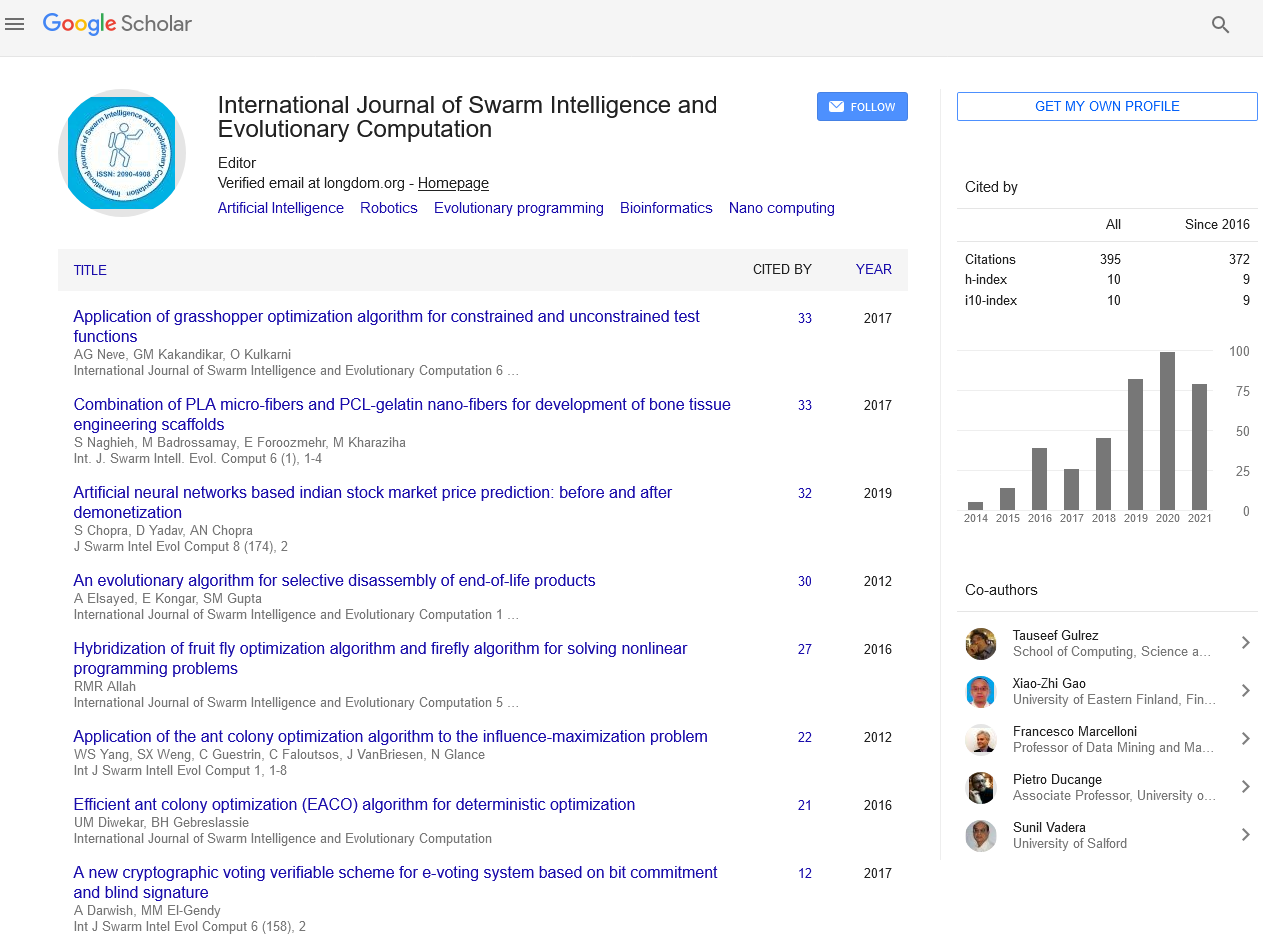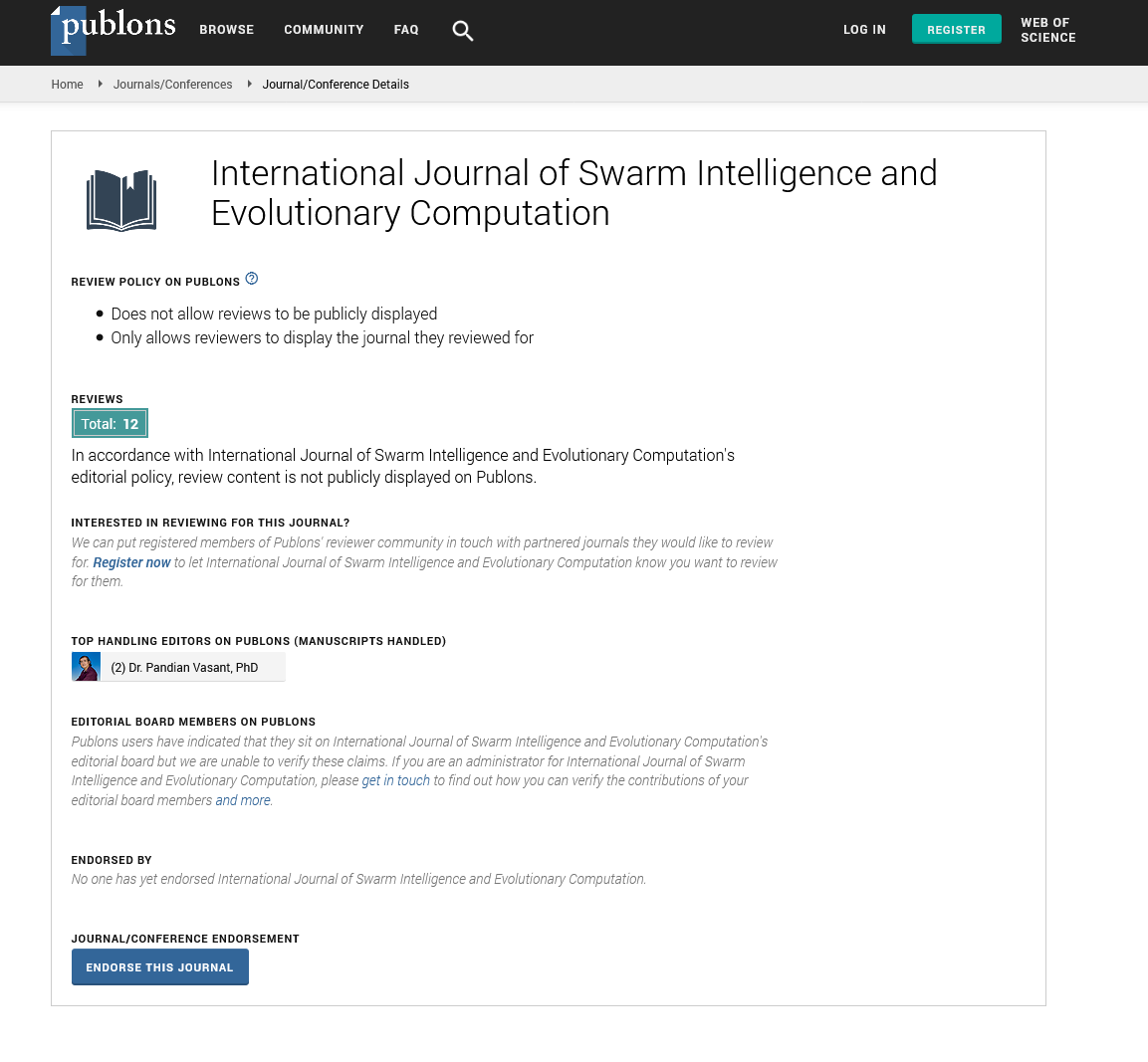Indexed In
- Genamics JournalSeek
- RefSeek
- Hamdard University
- EBSCO A-Z
- OCLC- WorldCat
- Publons
- Euro Pub
- Google Scholar
Useful Links
Share This Page
Journal Flyer

Open Access Journals
- Agri and Aquaculture
- Biochemistry
- Bioinformatics & Systems Biology
- Business & Management
- Chemistry
- Clinical Sciences
- Engineering
- Food & Nutrition
- General Science
- Genetics & Molecular Biology
- Immunology & Microbiology
- Medical Sciences
- Neuroscience & Psychology
- Nursing & Health Care
- Pharmaceutical Sciences
Commentary - (2021) Volume 0, Issue 0
Artificial Intelligence Transforming the World
Suraj Kumar*Received: 09-Aug-2021 Published: 30-Aug-2021, DOI: 10.35248/2090-4908.21.s4.003
Description
Artificial intelligence (AI) is a wide-going apparatus that empowers individuals to reevaluate how we incorporate data, examine information, and utilize the subsequent experiences to further develop effective and right now it is changing varying social statuses.
Despite its broad lack of familiarity, AI is an innovation that is changing every day of life. It is a wide-going device that empowers individuals to re-examine how we coordinate data, dissect information, and utilize the knowledge on AI for more advancement in technology. Our expectation through this far reaching outline is to disclose AI to an audience of policymakers, assessment leaders, and interested onlookers, and show how AI as of now is changing the world and bringing around huge issues for society, the economy, and organization.
In order to maximize AI benefits, we recommend nine steps for going forward:
Empower more prominent information access for scientists without undermining clients which is privacy.
Invest greater government subsidizing in unclassified AI research.
Usage of advanced new models of computerized education and AI work will improve the economy in 21st-century.
Make a federal AI warning advisory to make strategy suggestions.
Engage with state and neighborhood authorities so they authorize powerful arrangements.
Manage wide AI standards as opposed to specific algorithms.
Take bias complaints seriously so AI doesn't replicate historic injustice, unfairness, or discrimination in data or algorithms.
Maintain instruments for human oversight and control, and Penalize malicious AI behavior and promote cyber security.
Qualities of artificial intelligence
Despite the fact that there is no consistently settled upon definition, AI for the most part is thought to allude to "machines that react to incitement steady with traditional responses from people, given the human limit with regards to contemplation, judgment and aim. As indicated by some research studies, these software systems "settle on choices which ordinarily require human level of expertise" and assist individuals with expecting issues or manage issues. Accordingly, they work in a purposeful, intelligent, and versatile way.
Artificial intelligence algorithms are intended to decide, regularly utilizing on-going information. They are unlike passive machines that are fit uniquely of mechanical or predetermined reactions. Utilizing sensors, digital data, or remote inputs, they join data from a wide range of sources, dissect the material immediately, and follow up on the bits of knowledge got from that information. With huge upgrades storage systems, processing speeds, and analytic techniques, they are fit for tremendous sophistication in analysis and decision making.
AI generally is undertaken and large is attempted related to AI and data analytics. Artificial intelligence takes data and looks for essential patterns. On the off chance that it spots something significant for a useful issue, programming originators can take that information and use it to analyze specific issues. All that is required are data that are sufficiently robust that algorithms can recognize useful patterns. Data can come as computerized data, satellite symbolism, visual data, text, or unstructured information.
Applications in diverse sectors
AI is definitely not a modern vision, yet rather something here today and being coordinated with and sent into a variety of sectors. This incorporates fields like money, public safety, medical services, criminal equity, transportation, and smart cities. There are various models where AI as of now is having an effect on the world and increasing human capacities fundamentally.
Artificial intelligence in health sector: AI tools are assisting designers with working on computational refinement in medical care. For instance, Merantix is a German organization that applies deep learning to medical issues. It has an application in clinical imaging that "perceives lymph focus focuses in the human body in Computer Tomography (CT) pictures. As per its designers, the key is naming the hubs and recognizing little sores or developments that could be hazardous. Individuals can do this; anyway radiologists charge $ 100 consistently and might have the choice to carefully read only four images for 60 minutes. In case there were 10,000 pictures, the expense of this interaction would be $ 250,000, which is restrictively costly whenever done by people.
AI has been applied to congestive cardiovascular breakdown also, a disease that torments 10% of senior residents and expenses $ 35 billion every year in the United States. Man-made intelligence instruments are useful in light of the fact that they "foresee ahead of time possible difficulties ahead and distribute assets to patient instruction, detecting, and proactive mediations that keep patients out of the medical clinic.
Citation: Kumar S (2021) Artificial Intelligence Transforming the World. Int J Swarm Evol Comput. S4:003.
Copyright: © 2021 Kumar S. This is an open-access article distributed under the terms of the Creative Commons Attribution License, which permits unrestricted use, distribution, and reproduction in any medium, provided the original author and source are credited.


